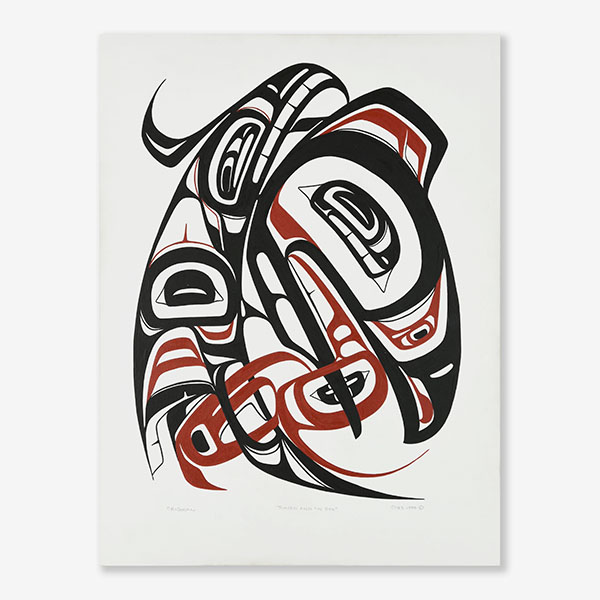
- Engage with Us
Explore the Collection
- Enrich your Mind
- Jewelry
- Graphics
Availability: Only 1 available
Acrylic paint on Acid-free paper
2003
Framed
CA$1,850.00
Only 1 available
Reserve this artworkYou may choose to reserve an item in consideration of purchase by clicking the "Reserve for Purchase" button (instead of Add to Shopping Cart). This allows you the opportunity to contact our gallery with any inquiries prior to purchase and it will ensure the item continues to be on hold while you are communicating with us.
If you should find an item already on "Reserve" that is of interest to you, please contact us directly at 604.684.9222 or [email protected] and we can provide you with the status of the piece and whether it will become available for purchase again, or if the sale is in progress with a buyer.
One of life’s most rewarding experiences is collecting fine art, and sometimes it’s best to take a little more time to make these acquisitions with ease. We understand and want to do everything possible to make collecting your next artwork more comfortable. At Coastal Peoples Gallery, we offer an interest-free layaway program and offer flexible terms which can be customized to your individual needs.
Acrylic paint on Acid-free paper
2003
Framed
| Colour | Red, Black, Blue |
|---|---|
| Shape | Square |
| Dimensions | 18.25 x 18 x 1.25" (46.36 x 45.72 x 3.18cm) |
| Product Number | S-5790 |

|
|
|---|---|
| Artist | Chester (Chaz) Patrick |
| Nation | Gitxsan |
| Description | Gitksan Nation (1958 – 2008) Chester Patrick was born in 1958 and raised in the village of Gitanmaax near Hazelton, B.C. Always interested in art, Chester was schooled at an early age as a principal dancer with Ksan Performing Arts and later attended the Gitanmaax School of Northwest Coast Indian Art. Under the guidance of Gitksan Elders and the tutelage of his instructors, Vernon Stephens, Ken Mowatt, Walter Harris, Earl Muldoe and Art Sterritt, Chester’s knowledge of his culture is reflected in his both design and context of his artistry. During his time at Gitanmaax School he got the nickname “Chaz”- the letter “C” for his first initial and the “Haz” for the first three letters in “Hazelton.” Chester is more commonly known by his nickname Chaz, which he also uses to sign his completed works. Since 1975, Chaz has worked as an artist. Although his pieces are created primarily in yellow cedar, which provides clean, well-defined cuts that highlight his design, he also paints original works in acrylic paints. Design and context are the fundamental elements found within all his pieces. His repertoire includes cedar flat relief, two-dimensional and three-dimensional design such as masks, bowls, spoons, miniature poles, frontlets, panels, and full-scale poles, while his original paintings illustrate design and oral traditions. As an artist, Chaz’s gift is to communicate, celebrate and illuminate respect for his culture. Gitksan stories, legends, songs and dances inspire his artwork and he continues to be a student of his art; listening and learning from his culture both past and present. His work can be found in private collections, galleries and public institutions throughout North America and Europe.
Accolades: 2007 British Columbia Creative Achievement Award for First Nations’ Art |
Serigraph, Edition of 100
2000
Unframed
(For inquiries on custom framing, please contact the gallery)
Serigraph, Edition of 200
2011
Unframed
(For inquiries on custom framing, please contact the gallery)
Also available in Red
Joe Wilson has created this limited-edition print series illustrating the traditional Coast Salish whorl in which both the male and female Killerwhale are represented in balance and harmony with one another.
The ‘Journey of Hope’ was designed specifically for the survivors of the tsunami in Japan in 2011 to pay tribute to their survival instincts as well as their future hopes and dreams.
The Killerwhale is an important crest symbol, associated with power, strength, dignity and communication.
The Killerwhale is thought to be the reincarnation of great chiefs so they are the majestic protectors of mankind. Many believed that those lost at sea were carried away by the Orca to their villages deep within the ocean and they would be guided to a new life and a new beginning.
Killerwhale Clans live in Killerwhale Villages deep within the ocean; when at home they remove their skins and live as large humans. Mating once for life and thought to be the reincarnation of great chiefs, these majestic animals are the protectors of mankind. While known to capsize canoes and carry the inhabitants to their Killerwhale Village, they are also reputed to act as guides to humans caught within storms.
Serigraph, Edition of 270
Unframed
(For inquiries on custom framing, please contact the gallery)
Serigraph, Edition of 80
2006
Unframed
(For inquiries on custom framing, please contact the gallery)
Red Cedar wood, Leather, Feather, Acrylic paint
c. 1997
Exclusive to Coastal Peoples Fine Arts Gallery
Glass; etched and sandblasted (Glass thickness 12mm)
Maple wood base
Salmon are honoured and celebrated by all coastal peoples: the fish serves as a powerful symbol of regeneration, self-sacrifice and perseverance.
Shortages of Salmon are traditionally attributed to human disrespect and refusal to listen to and live by the wisdom of elders. The Pacific Northwest Coast peoples believed that Salmon were actually people with eternal life who lived in a large house far under the ocean. In spring, they put on their Salmon disguises and offered themselves to humans as food.
Acrylic on Acid-free board
2004
Unframed
CAD |
$ |
USD |
$ |
EUR |
€ |
GBP |
£ |
AUD |
AU$ |
CHF |
CHF |
NZD |
NZ$ |
JPY |
¥ |
|
CAD
|
USD
|
EUR
|
GBP
|
AUD
|
CHF
|
NZD
|
JPY
|

